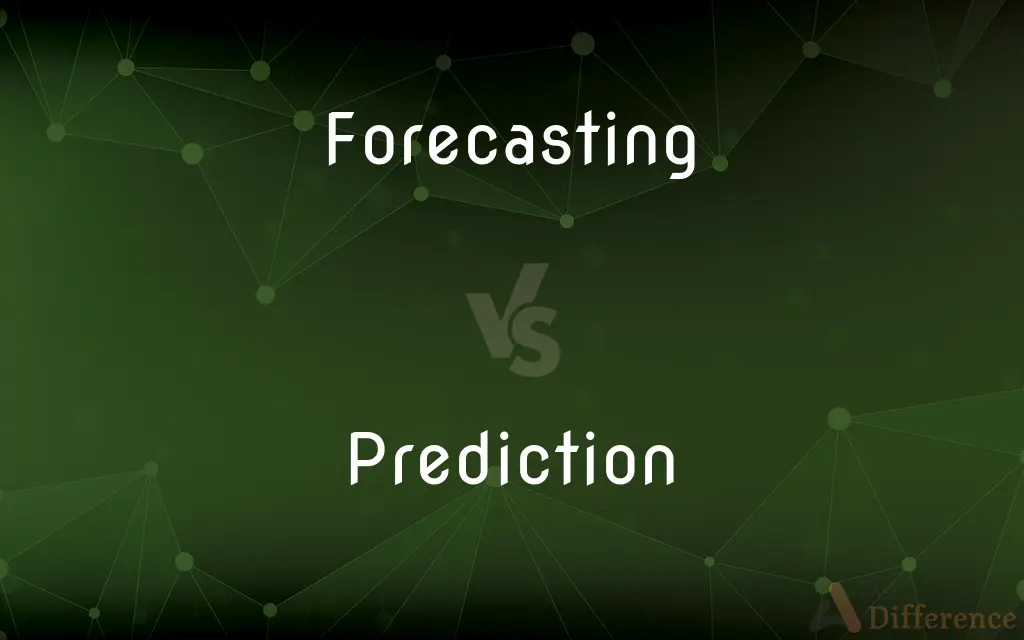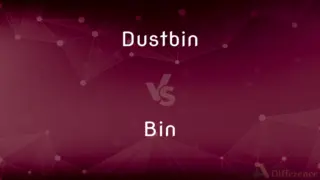Forecasting vs. Prediction — What's the Difference?
By Urooj Arif & Fiza Rafique — Updated on March 20, 2024
Forecasting involves using historical data to make informed estimates about future events, focusing on specific trends or patterns, while prediction is a broader term that can involve forecasts but also includes assumptions, guesses, or models.

Difference Between Forecasting and Prediction
Table of Contents
ADVERTISEMENT
Key Differences
Forecasting is a technique used primarily in fields like meteorology, finance, and supply chain management, where historical data is analyzed to identify trends and patterns that are then used to make informed estimates about future events. On the other hand, prediction is a more encompassing term that refers to the act of making statements about events that have not yet occurred.
In forecasting, the emphasis is on quantifiable data from the past to project into the future. This method is particularly useful in situations where the past is a reliable indicator of future trends, such as predicting weather patterns, stock market trends, or consumer behavior. Whereas predictions can be more speculative and may involve a broader range of methods, including expert judgment, theoretical knowledge, or even speculative assumptions, not just historical data.
Forecasting often applies to specific, often quantitative, outcomes within a defined time frame, like the amount of rainfall expected next month or the projected sales growth for the next quarter. Predictions, however, can be more qualitative and do not necessarily have to be tied to specific metrics or time frames. For example, predicting the outcome of a political election or the potential impact of a new technology on society.
The accuracy of forecasting is generally higher in contexts where patterns are consistent or cyclical, thanks to the reliance on substantial historical data. Predictive accuracy, by contrast, can vary widely depending on the method and the nature of what is being predicted. For instance, long-term forecasts in rapidly changing fields like technology or politics can be less reliable than short-term weather forecasting.
While both forecasting and prediction are aimed at providing insights into future events, the approach and reliability of these methods can differ significantly. Forecasting's reliance on historical data makes it a preferred method in scenarios where past patterns are expected to continue, whereas predictions are more flexible, allowing for a wider range of possibilities, including those without historical precedent.
ADVERTISEMENT
Comparison Chart
Basis
Historical data and trends
Any information, including data, theory, or speculation
Focus
Specific trends or patterns
Broad future events
Reliability
Higher in consistent patterns
Varies widely
Application Fields
Meteorology, finance, supply chain
Broader, including politics, technology
Quantitative/Qualitative
Often quantitative
Can be both qualitative and quantitative
Compare with Definitions
Forecasting
Anticipating consumer demand.
Sales forecasting helps manage inventory levels.
Prediction
Guessing future trends.
Fashion predictions influence next season's designs.
Forecasting
Estimating future weather conditions.
The weather forecasting predicts rain next week.
Prediction
Speculating on outcomes.
Predicting the success of a new product in the market.
Forecasting
Predicting stock market trends.
Economic forecasting indicates a rise in market values.
Prediction
Anticipating technological advancements.
Predictions about AI's impact on jobs are widespread.
Forecasting
Projecting future sales.
Revenue forecasting is crucial for budget planning.
Prediction
Forecasting election outcomes.
Political analysts make predictions about election winners.
Forecasting
Planning resource allocation.
Workforce forecasting ensures adequate staffing.
Prediction
Estimating future events without data.
Predicting a surprise in an upcoming event.
Forecasting
Forecasting is the process of making predictions based on past and present data and most commonly by analysis of trends. A commonplace example might be estimation of some variable of interest at some specified future date.
Prediction
A prediction (Latin præ-, "before," and dicere, "to say"), or forecast, is a statement about a future event. They are often, but not always, based upon experience or knowledge.
Forecasting
To estimate or predict in advance, especially to predict (weather conditions) by analysis of meteorological data.
Prediction
The act of predicting.
Forecasting
To serve as an advance indication of; foreshadow
Price increases that forecast inflation.
Prediction
Something foretold or predicted; a prophecy.
Forecasting
A prediction, as of coming events or conditions
The weather forecast stated that it would rain.
Prediction
A statement of what will happen in the future.
Forecasting
Present participle of forecast
Prediction
(statistics) A probability estimation based on statistical methods.
Forecasting
A forecast or prediction.
Prediction
The act of foretelling; also, that which is foretold; prophecy.
The predictions of cold and long winters.
Forecasting
The process of calculating and predicting future events, usually based on extrapolation from past experience, and with varying degress of uncertainty.
Prediction
The act of predicting (as by reasoning about the future)
Forecasting
A statement made about the future
Prediction
A statement made about the future
Common Curiosities
Are predictions without data reliable?
Predictions without data can vary in reliability and often depend on the predictor's expertise or the nature of the prediction.
Can forecasting always predict future events accurately?
While forecasting uses historical data to improve accuracy, it cannot always predict future events accurately due to unforeseen variables.
What is the main difference between forecasting and prediction?
Forecasting is based on historical data and trends, while prediction can involve broader methods, including speculation or theoretical models.
Why is forecasting important in business?
Forecasting helps businesses plan for the future by estimating trends in sales, demand, and market dynamics.
How do businesses use forecasts and predictions?
Businesses use forecasts and predictions for strategic planning, risk management, and to inform decisions on investment, marketing, and resource allocation.
Are all forecasts based on statistical models?
Most forecasts use statistical models, but some may also incorporate expert judgment or qualitative analysis.
Can prediction be considered a form of forecasting?
Prediction is a broader term that can include forecasting, but it also encompasses other methods of anticipating future events.
What role does machine learning play in forecasting and prediction?
Machine learning can improve both forecasting and prediction by analyzing large datasets to identify patterns and make more accurate projections.
Is forecasting more reliable than prediction?
Forecasting tends to be more reliable when historical data is a good indicator of future trends, while the reliability of predictions varies more.
Can predictions influence the events they predict?
Yes, predictions can sometimes influence future events, especially if they affect human behavior or decisions.
How do weather forecasts differ from economic predictions?
Weather forecasts rely on meteorological data and models, while economic predictions may use a variety of data, models, and expert opinions.
Why are some predictions more accurate than others?
The accuracy of predictions depends on the method, the data used, the expertise of the predictor, and the predictability of the event itself.
What is the significance of qualitative predictions?
Qualitative predictions can provide insights into trends, potential impacts, and general directions of future developments.
How can forecasting improve decision-making?
By providing data-driven insights into future trends, forecasting helps decision-makers reduce uncertainty and make more informed choices.
How do unpredicted events affect forecasts and predictions?
Unpredicted events, or "black swan" events, can significantly impact the accuracy of forecasts and predictions, revealing the limits of these methods.
Share Your Discovery

Previous Comparison
Bed vs. Bedding
Next Comparison
Dustbin vs. BinAuthor Spotlight
Written by
Urooj ArifUrooj is a skilled content writer at Ask Difference, known for her exceptional ability to simplify complex topics into engaging and informative content. With a passion for research and a flair for clear, concise writing, she consistently delivers articles that resonate with our diverse audience.
Co-written by
Fiza RafiqueFiza Rafique is a skilled content writer at AskDifference.com, where she meticulously refines and enhances written pieces. Drawing from her vast editorial expertise, Fiza ensures clarity, accuracy, and precision in every article. Passionate about language, she continually seeks to elevate the quality of content for readers worldwide.
















































